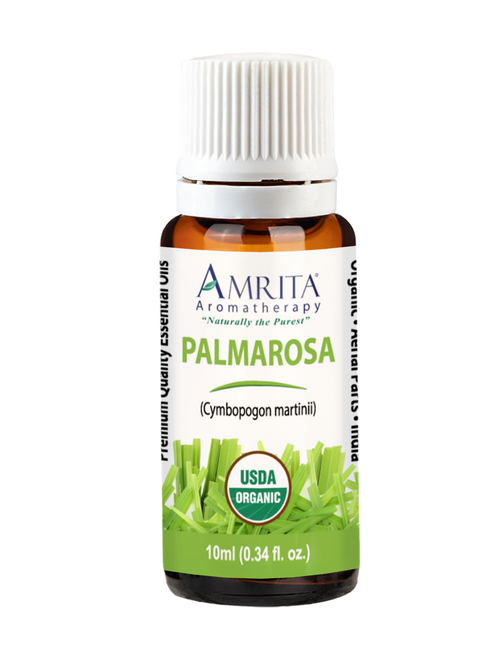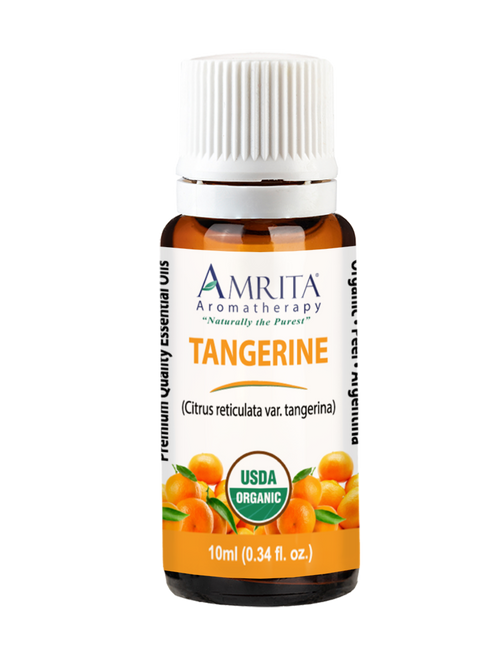- Other Names
- Indian Geranium, East Indian Geranium, Rosha, and Rosha Grass
- Farming Method
- Certified Organic
- Plant Part
- Aerial Parts
- Country of Origin
- India
- Application Method
- Bath, Diffusion, Inhalation, Massage, and Topical
- Scientific Name
- Cymbopogon martinii
- Extraction Method
- Steam Distilled
Palmarosa Organic Essential Oil is steam-distilled from the blossoms and other aerial parts of a perennial grass that grows wild in India. Even before the essential oil of Palmarosa was first distilled, the crushed plant was used in antiquity to relieve digestive issues and much more.*
One of nature’s most uplifting essential oils for soothing frazzled nerves is Palmarosa.* Palmarosa has long been cherished for its calming effects.* This essential oil is a remarkably simple way to soothe your spirit and find moments of eased tension whenever life’s worries threaten to overwhelm.*
Palmarosa is understood to possess antiseptic, antifungal, and antibacterial properties and is utilized extensively within the skin care industry.* It is widely used in perfumes, lotions, and soaps due to its elegantly rosy, sweet, and floral aroma. Please read in the overview what Dr. Streicher specifically says about Palmarosa.
About the Plant:
Palmarosa is a tufted perennial grass with numerous stiff, slender stems. These give rise to fragrant leaves and terminal flowering tops, combining to give the plant an average height of about 2.5 meters (8 feet). The grass is sufficiently hardy to withstand drought and other harsh conditions, lending itself to widespread availability for those who recognize its innate potential for therapeutic value.
Where It Grows:
Palmarosa grows wild in India, particularly northeast of Bombay towards the Himalaya Mountains. The grass can also be found growing wild in Pakistan and is now cultivated in parts of Africa, Indonesia, Brazil, the Seychelles Islands, and the Comoro Islands.
Traditional Uses and Lore:
While it is hard to pinpoint exact historical references to Palmarosa use in antiquity, it is quite apparent that ancient Ayurvedic medicine utilized it for a number of purposes. Some of these included skin care, perfumery, aromatherapy, soothing of digestive issues, and for its antiseptic, antifungal, and antibacterial properties.* It is also clear that use of Palmarosa quickly spread to other cultures, such as the Ancient Chinese, as knowledge of its therapeutic and aromatic properties became more understood.*
Numerous historical anecdotes note that Palmarosa Oil was often added to Rose Oil as a method of enhancing its aromatic profile while also further stretching the existing supply. This is, in part at least, why it became known as “palma rosa.”
Constantinople became the nexus where East met West in ancient trading markets, becoming the springboard from which Palmarosa was introduced to Europeans. This paved the way for its popularity in the Western Hemisphere, in addition to its already long-lived notoriety in the East.
By the time Westerners like the British and Dutch had been introduced to Palmarosa, it was already being distilled into essential oil form in many cases, though modernized steam-distillation techniques have continued to improve the quality and consistency of Palmarosa Oil and others.
Other Facts:
-
-
- Scent: Soft, Sweet, and Rosy with Hints of Citrus
- Fragrance Note: Middle Note
- Composition: Geraniol, Myrcene, Linalool, Geranyl Acetate, and Limonene
- Family: Gramineae Family
-
Dr. Streicher Says:
There are 3 rose-like essential oils: Palmarosa, Rosewood, and Rose Geranium. They are all calming, often used to mimic Rose, but of course they never come close. Botanically speaking, they are very different. Palmarosa is a grass, Rosewood is distilled from the timber of a tree, and Rose Geranium is distilled from the aerial parts of the plant including the flowers. The dominant compound in: Palmarosa is geraniol, Rosewood is linalool, and Rose Geranium is a mix of these two plus terpenes and esters. This is why these 3 complement each other very well.
*These statements have not been evaluated by the Food and Drug Administration. These products are not intended to diagnose, treat, cure, or prevent any disease.
- USDA Certified Organic
- Aids in Healthy Digestion
- Calms the Nerves and Uplifts the Spirit
- Helps Regulate Sebum Production
- Check out the tabs below to learn more about Palmarosa
Topical Application (for use on the skin):
| ||||
|
| ||||
|
|
Diffusion / Inhalation Application (add a few drops to a nebulizer or nasal inhaler):
|
|
-------------------------------------------------------------------------------------------------------------------------------------------------------------------
Blends Well With:
- Bergamot, Jasmine, Lavender Extra, Red Mandarin, and Neroli
-------------------------------------------------------------------------------------------------------------------------------------------------------------------
Safety Precautions:
- Palmarosa Essential Oil is non-toxic, non-irritant, and non-sensitizing when properly diluted.*
- With topical use it is recommended, however, to perform a patch test on a small area of skin before applying more liberally in order to ensure there is no sensitization.*
General Precautions:
- Use essential oils only in diluted form on the skin and never internally.
- Always be careful when using essential oils with children.
- Give them only low doses, or better, consult a qualified aromatherapy expert before using.
- Also, use essential oils with care and only under the proper guidance of an expert while pregnant or if you have liver damage, epilepsy, cancer, or other serious health problems.
*These statements have not been evaluated by the Food and Drug Administration. These products are not intended to diagnose, treat, cure, or prevent any disease.
The uniquely floral, yet citrusy aroma of Palmarosa Essential Oil has long been recognized for its balanced cordiality, as well as for its abilities to calm the nervous system while simultaneously uplifting the spirit.* It is said that Palmarosa encourages free-flowing adaptability and a feeling of security.* Many find it quite soothing for those who experience difficulty due to the frequent or prolonged absence of loved ones.* While these effects may be hard to measure in rigidly scientific parameters, they have been long understood and recognized by Ancient Ayurvedic and Chinese medicine.*
The benefits of Palmarosa are certainly not limited to the mind and spirit, however. It is extremely effective as a digestive and tonic.* Due in part to its beneficial effects on pathogens of the intestinal flora, Palmarosa is highly regarded as an aid in mitigating flatulence (gas), digestive sluggishness, and loss of appetite.* It has become common practice in parts of India, West Africa, and elsewhere to add crushed Palmarosa leaves to certain dishes; not only because of its abilities in aiding digestion, but also to make use of its antiseptic, antifungal, and antibacterial properties for keeping food clean and safe.*
The same antiseptic, antifungal, and antibacterial properties also lend themselves to Palmarosa’s recognition as a highly sought-after ingredient for skin and hair care.* These qualities, along with the reputed abilities of Palmarosa Essential Oil to regulate sebum production and regenerate new skin cells, combine wholistically to endow this oil with a host of benefits to the skin and hair.* It can be a soothing remedy for those suffering from dry skin, dandruff, acne, blemishes, minor infections, cuts, abrasions, and scars.* Many even claim that it helps to encourage healthier, fuller growth of hair and nails.* All this, along with the fact that its aroma is so nice, leads to huge implications for what Palmarosa can accomplish in regard to hair and skin health.
The following is a list of conditions which Palmarosa Essential Oil addresses by category:
|
|
|
*These statements have not been evaluated by the Food and Drug Administration. These products are not intended to diagnose, treat, cure, or prevent any disease.
Bottles are filled by volume. Some bottle sizes may not be filled to the top, but do contain the volume of oil specified.
| Click the links below to view GC Analysis: | Click the links below to view CoA Analysis: |
| Click the link below to view Safety Data Sheet (SDS): |











